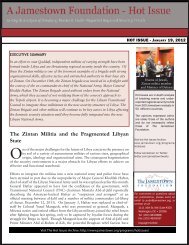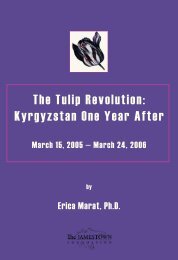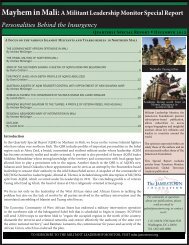By Brian Glyn Williams - The Jamestown Foundation
By Brian Glyn Williams - The Jamestown Foundation
By Brian Glyn Williams - The Jamestown Foundation
Create successful ePaper yourself
Turn your PDF publications into a flip-book with our unique Google optimized e-Paper software.
<strong>The</strong> Tatars' valuable skills as guides on the steppe were noticed by a nineteenth century observer who<br />
wrote:<br />
One might as well attempt to steer a vessel at sea without a compass, as to journey over<br />
one of these boundless plains without a Tatar guide, whose practiced eye can always<br />
estimate the distance by the position or peculiar form of tumuli, which he separately<br />
distinguishes, and with the same facility as a shepherd does his flocks and herds. Indeed,<br />
the Tatar of these Russian steppes is not less distinguished for the sharpness of his eyesight<br />
than the quickness of his hearing. 49<br />
<strong>The</strong> Ottoman force arrived at Astrakhan on September 16, 1569, without any mishaps and the Serdar quickly<br />
commenced siege operations. Despite the Porte’s high expectations of success, the Russian's fortifications<br />
proved to be too strong for the Ottoman besiegers who had no heavy cannons to destroy the enemy defenses.<br />
This difficulty, combined with the early approach of winter and a mutiny among the troops, forced the<br />
Ottoman commander to withdraw at the end of September. W.E.D. Allen puts part of the blame for this<br />
retreat on the Khan, Devlet Giray, and claims the Ottoman troops revolted against their commander<br />
after hearing that the Khan's forces were returning to the Crimea for the winter. 50<br />
In describing the Ottoman retreat from Astrakhan, George Eversley claims that:<br />
<strong>The</strong> expedition was a total failure. <strong>The</strong> Turks were unable to capture Astrakhan, and a<br />
Russian army completely destroyed that of the Tatars. <strong>The</strong> main Turkish army was<br />
compelled to retreat to Azoff. 51<br />
Massa's account, which may have been used as source by Eversley, makes the same claim but his<br />
writings are often unreliable on account of their pro-Russian bias. Kurat, on the other hand, claims that:<br />
<strong>The</strong>ir retreat was certainly not due to pressure from Russian forces who had<br />
remained on the defensive and never engaged the Turks in a serious encounter. What<br />
really caused them to leave Astrakhan was the approach of winter and the growing<br />
shortage of provisions and supplies. 52<br />
Kurat also goes on to give an interesting insight into the Tatars' hardy character:<br />
<strong>The</strong> Turkish soldiers and horses died in their hundreds of hunger and thirst, and only a<br />
relatively small number arrived at Azak unscathed. <strong>By</strong> contrast losses were insignificant<br />
among the Crimean and Nogai Tatars who were inured to the hardships of this kind of<br />
march and avoided hunger and thirst by eating horse flesh and drinking mare's milk. 53<br />
Although this mission was certainly a failure, it was not a total loss according to Kortepeter who claims it taught<br />
the Russians an important lesson: "If the Ottomans so desired, they could always send another army to<br />
the steppe." 54 Devlet Giray, the Crimean Khan at the time of the Astrakhan campaign, more than made<br />
up for this failure in the next campaign to be analyzed, the great raid of 1571. In this attack a<br />
Crimean army broke through a Russian defense force and struck directly at Moscow itself. In the<br />
course of the raid, the victorious Tatars succeeded in carrying off tens of thousands of slaves into<br />
captivity and in burning down much of the Tsar's capital. <strong>The</strong> following account made by an English<br />
eyewitness observer, graphically demonstrates the effects of the Tatars' raid on a city that proudly called itself<br />
16
















